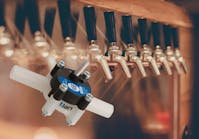ACCELEROMETER: A sensor that responds to acceleration, often using a piezo crystal that generates a voltage when distorted.
BUFFER: Temporary storage for data values in a process — with the additional sense, in hardware, of isolation or protection.
DATA LOGGER: A device that records acquired data for later collection.
EXTERNAL TRIGGER: A pulse on a control line that triggers sampling on other channels.
FFT: Fast Fourier Transform. A transform of signal data from time to frequency domains — an algorithm that analyzes a finite time series of data points into component frequencies.
INSTRUMENT AMP: A high-impedance differential amplifier with high common-mode rejection.
ISOLATION AMP: An instrumentation amplifier with electrically isolated inputs.
LVDT: Linear Variable Differential Transformer. A sensor that requires AC excitation of a primary coil to output AC from a secondary coil with amplitude that varies with position of a movable core.
OPTICAL ISOLATION: Optical signal transmission between electrically isolated networks.
PID: Proportional Integral Derivative. Control algorithm that moderates a proportional gain with integral and derivative time factors to hold a measurement or process variable at or near a set point.
RESOLUTION: A measure of the least possible change in relation to full scale — 10,000/4,096 = 2.44 mV, for example, at 12-bit resolution when 10 V represents full scale.
SAMPLING: Taking the value of signal, usually as a voltage, and then, typically, digitizing it.
SET POINT: Value of a variable that a controller maintains by responding to errors.
SOFTWARE TRIGGER: Real-time processing and analysis of one or more signals to determine some action by the system.
STRAIN GAUGE: Deformation-sensitive resistor bonded to material under test, part of a bridge circuit.
TIME STAMP: A count attached to a data item to record the units of time elapsed since a reference time.
UNIPOLAR: One of the terminals, the positive terminal, never has a lower voltage than the other.
The terms and definitions for this issue’s Word Search come from a glossary of terms compiled by Microstar Laboratories (www.mstarlabs.com), a provider of data acquisition hardware, software, and services.

